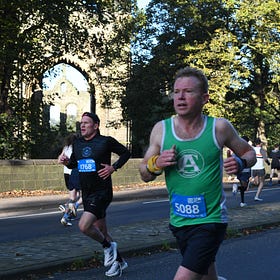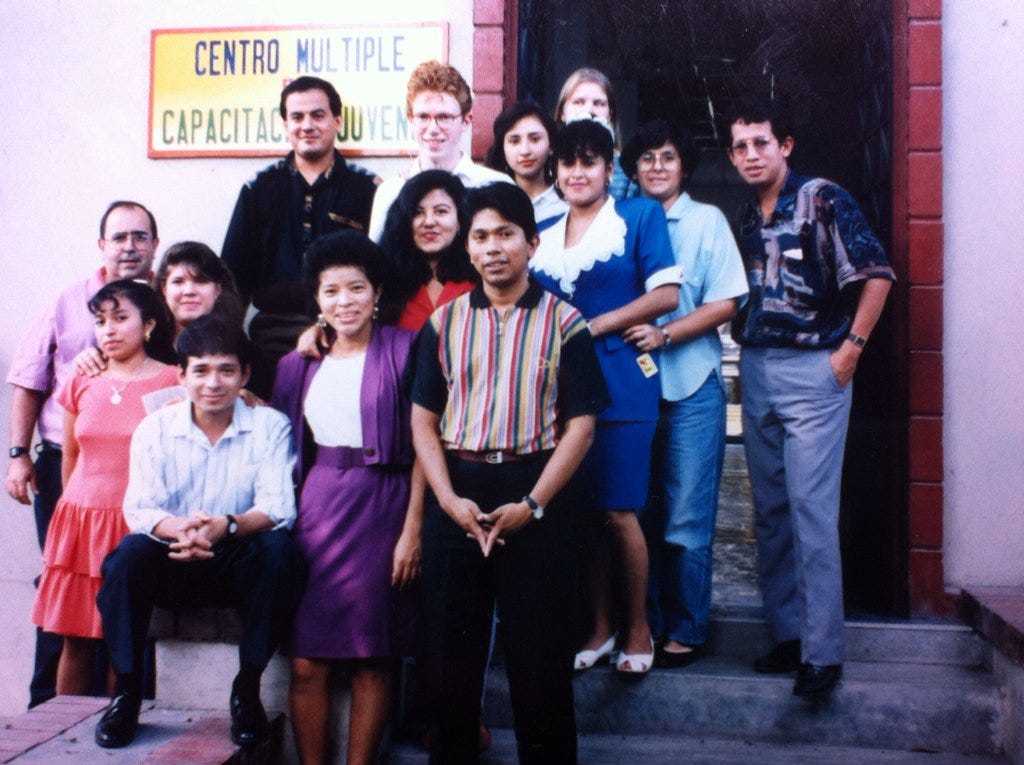Tuning in
A psychologist's perspective on how we might best respond to the climate crisis - with a big dose of compassion - both for ourselves and for others.
It’s been a while since I last wrote. A new part-time job means I need to find a slightly different routine to make sure I find the time to write. So this week’s post is a bit of mixed bag of various things that have caught my eye over the last few weeks.
Tuning in
I enjoyed this Ted Talk from climate psychologist Renee Lertzman.
One of the themes she explores is attunement - tuning in - both to yourself and to others. And how this is a vital first step in exploring how to effectively respond to the climate crisis.
I’ve written before about my own feelings - and how climate anxiety can easily lead to an overwhelming sense of not knowing what to do. And how that inaction can, understandably, feed deeper anxiety.
In her talk, one thing Renee explores is the concept of attunement.
She talks of the importance of tuning in to your own feelings in relation to the climate crisis.
“It’s easy to feel totally overwhelmed. Maybe a bit helpless, powerless, angry, on fire, numb, disconnected. Perhaps all of the above.
These messy and complicated feelings, they make total sense.”
So it’s a reminder to show yourself some compassion.
And then, to be similarly compassionate towards others.
Take time to tune in. To listen. To understand.
That can feel particularly challenging when we have an overwhelming sense of the urgency to act in the face of an existential crisis.
It can feel like we don’t have time for that kind of talk.
I just need to share some more facts with you to make you change your mind - and you need to just get on and do stuff.
That’s unlikely to be effective. But what might just work is a conversation where someone feels understood, and accepted for exactly where they are right now.
Good things can happen when we feel like no-one is trying to judge us, or shame us. When we are listened to.
And in turn, Renee suggests, this attunement can lay the foundations for the kind of creativity and ingenuity that we need in order to tackle the climate crisis.
Saving us
As I mentioned in this Linkedin post, I find myself coming back time and again to the work of climate scientist and communicator
.I recently re-read her excellent book, Saving Us. It’s well worth a read - and you can find a good overview of her perspective in this talk.
First up, Katharine is an excellent communicator - which sadly isn’t something you can say about a good few climate scientists.
I like how she frames the problem - the focus on saving us, not on saving the planet.
The planet will do just fine without us.
I also like how - in line with what Renee Lertzman talked about in relation to attunement - she emphasises the importance of taking time to find common ground - and to understand what it is that people care about.
The things they love where they live. And perhaps the changes they’ve seen, locally, with more extreme weather patterns.
More conversations about running races in hot weather, and fewer conversations about polar bears, maybe.
What I Talk About When I Talk About Climate Change
One of the things I enjoy most in life is running. Or more specifically, running in races. Races help me tap into a part of my personality that doesn’t come to the fore that often. My competitive streak. It might well be the case that most of my working life has had more to do with co-…
The voluntary sector and the state
In my previous job, much of our income came from local councils - working alongside them to deliver public services.
Done well, this kind of collaboration can bring real benefits - with each organisation focusing on what it does best.
I saw that in particular with our work on empty homes, where we achieved (and they continue to achieve, now I’ve moved on) things the council couldn’t, and vice versa.
Yet it’s increasingly obvious that after a decade of savage cuts to local council budgets, things just aren’t working any more. This Guardian editorial outlines the issues well.
I’ve seen it myself. When I co-founded a social enterprise in 2010 - with the explicit aim of encouraging more cross-sector collaboration - there was still capacity in the councils we worked with to explore innovative approaches - alongside some budget to invest in innovation.
With wave after wave of redundancies, and budget cuts & spending pressures pushing many councils closer to bankruptcy, that kind of collaboration is ever-harder to achieve. Precisely at the time when we need innovative thinking more than ever.
I learnt so much from a year in Ecuador
I suppose you end up doing what you do for all sorts of reasons - but one big influence for me was a year I spent volunteering with a youth organisation in Ecuador whilst I was at University, studying Spanish and French.
To do this day I’ve not worked with such a talented, committed group of people.
And I loved the country, and the chaotic port city I lived in, Guayaquil, which very much felt like a Latin American version of the city I grew up in, Liverpool.
So it breaks my heart to see the extremely difficult times the people of Ecuador are going through right now - in particular in and around Guayaquil.
This podcast offers insight into what’s going on - with the cocaine trade at the heart of the problem.
With most of the demand, of course, in richer countries - and in particular Europe.
As with the climate crisis, poorer countries suffer first, largely thanks to the consumption patterns of richer countries. It’s not fair to leave poorer countries to sort out these problems on their own.
Some inspiration
When we see examples of other people doing good stuff, it helps us to develop that sense of being able to do things ourselves - a sense of agency. So I try hard to keep an eye out for good things that are happening - like this big investment in a project to heat swimming pools with the excess heat from data centres.
And closer to (my) home, it’s good to see empty homes renovation charity Canopy Housing sharing what they’re learning about retrofitting a terraced house in inner-city Leeds.
And finally, I read Oliver Burkeman’s book 4000 weeks last month - on the recommendation of Katherine Ellsworth-Krebs. If, like me, you sometimes feel overwhelmed by a sense of wanting to make every second count - in the face of the climate crisis - you might find it a useful read.
How can I help?
I recently started work as a part-time Enterprise Coach - so if you’re a social entrepreneur in the West Yorkshire districts of Kirklees or Wakefield and would like to find out about the free support I can offer, please book a meeting with me.
And I still have time for freelance work too - focusing in particular on helping people and organisations to understand the climate crisis, and then move on to working out what it is you’re best placed to do to respond to the situation we find ourselves in.
If you’d be interested in working with me you can find out more here - and you’ll find a link there too to book an introductory call.
And finally - one from the archive
Here’s a post from this time last year, about a conversation I didn’t have with my Pilates classmates.
Challenging conversations
I laid myself down on the exercise mat and closed my eyes. I was early for the class — it’s a popular one and you need to get there handy to bagsy a good spot. It was nice just to have a few minutes, as others arrived, set themselves up and chatted about this and that.





